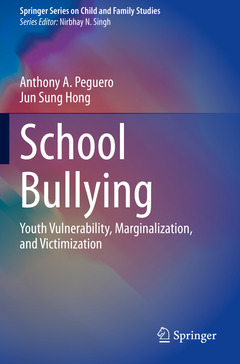School Bullying, 1st ed. 2020 Youth Vulnerability, Marginalization, and Victimization Springer Series on Child and Family Studies Series

This book examines the associated experiences of school bullying and violence among vulnerable and marginalized youth. It discusses the effects of diversity and disparities in youth?s experiences with bullying. Among these are socioeconomic and social status, family cohesion and interactions, sex, sexual orientation, gender identity and gender expression, race, ethnicity, immigration, religion, and disabilities and special health needs. The book describes the ways in which a social-ecological framework can inform the problem and address school bullying. It addresses not only individual, intrapersonal, and environmental factors of bullying, but also discusses distal level factors and conditions that are specifically relevant to youth (e.g., culture and law). In addition, this volume contextualizes relevant multilevel factors that foster or inhibit bullying victimization among vulnerable and historically marginalized children and adolescents who are faced with cumulative social stratification.
Key areas of coverage include:
- The role of the family (parents and guardians, siblings) ? its cohesion and interactions ? in school bullying.
- Race, ethnicity, immigration, and religion and school bullying of marginalized and at-risk youth.
- Victimization of students with physical, emotional, and learning disorders.
- Bullying and victimization of vulnerable youth in the court systems.
School Bullying is an essential resource for researchers, clinicians and other practitioners, graduate students, and policymakers across such disciplines as child and school psychology, social work and counseling, pediatrics and school nursing, educational policy and politics, and all interrelated disciplines.
Anthony A. Peguero, Ph.D., is a Professor of the T. Denny Sanford School of Social and Family Dynamics and School of Criminology and Criminal Justice at Arizona State University. Dr. Peguero’s research focuses on youth violence, socialization and marginalization, education, and the adaptation of the children immigrants. Overarching themes in Dr. Peguero’s research include the barriers and challenges faced by the children of immigrants; how social inequality is central for sociological and criminological theories toward understanding and addressing youth violence; the intersection of race/ethnicity, immigration, and gender in relationship to youth marginalization, particularly within schools; and policies intended to promote safety and equity for youth. Dr. Peguero serves as the Director of the Laboratory for the Study of Youth Inequality and Justice, Research Fellow at the Institute for Society, Culture and Environment, and Research Affiliate of the Center for Peace Studies and Violence Prevention at Virginia Tech. He is also a member of the Racial Democracy, Crime, and Justice Network and co-founder of Latina/o/x Criminology which both hold the goals of advancing research on the intersection of race, crime, and justice and promoting racial democracy within the study of these issues by supporting junior scholars from under-represented groups.
Jun Sung Hong, Ph.D., is an Associate Professor in the School of Social Work at Wayne State University. He is currently the Co-Associate Director of the Laboratory for the Study of Youth Inequality and Justice (at Virginia Tech). He had also been an Adjunct Assistant Professor at Sungkyunkwan University (summer) in Seoul, South Korea from 2015 to 2019. For the past several years, Sung Hong has primarily researched factors associated with bias-based bullying and peer victimization (both face-to-face and cyberbullying) of racial/ethnic minority, im
Examines school bullying and violence among vulnerable and marginalized youth
Discusses effects of diversity and disparities (e.g., socioeconomic status, family relationship, gender identity, race, religion, and disabilities) on youth’s experiences with bullying
Uses a social-ecological framework to inform and address school bullying
Addresses issues of bullying and victimization of vulnerable youth in the court systems
Date de parution : 12-2021
Ouvrage de 134 p.
15.5x23.5 cm
Date de parution : 12-2020
Ouvrage de 134 p.
15.5x23.5 cm
Thèmes de School Bullying :
Mots-clés :
Academic achievement and school bullying; Court systems and school bullying; Ethnicity and bullying at school; Family; bullying; school; Gender; gender identity and school bullying; Immigration and school bullying; Intellectual disabilities; bullying; school; Law enforcement and bullying at school; Marginalization and bullying at school; Parents; guardians; and bullying at school; Physical disabilities; bullying; school; Poverty and school bullying and violence; Race and school bullying; Religion and bullying at school; Sexual orientation and bullying at school; Siblings and school bullying; Socioeconomic inequality and school bullying; Vulnerable children and school bullying; Youth violence and school bullying; Youth violence and social stratification



